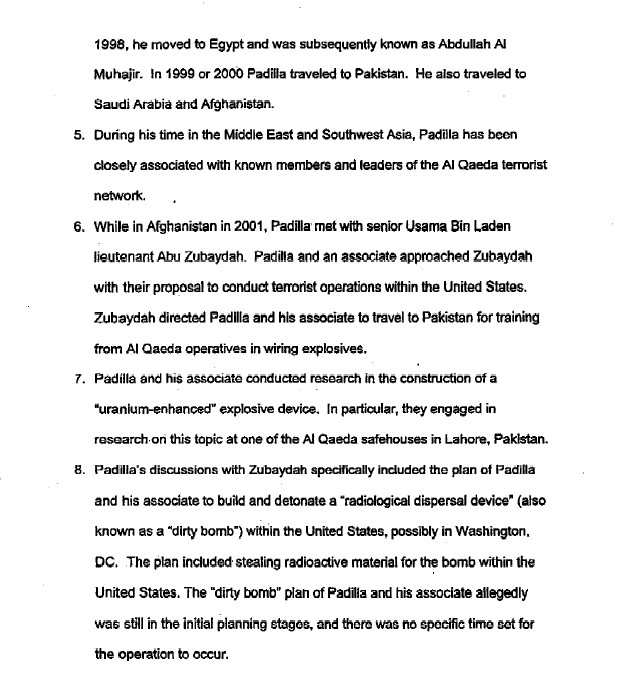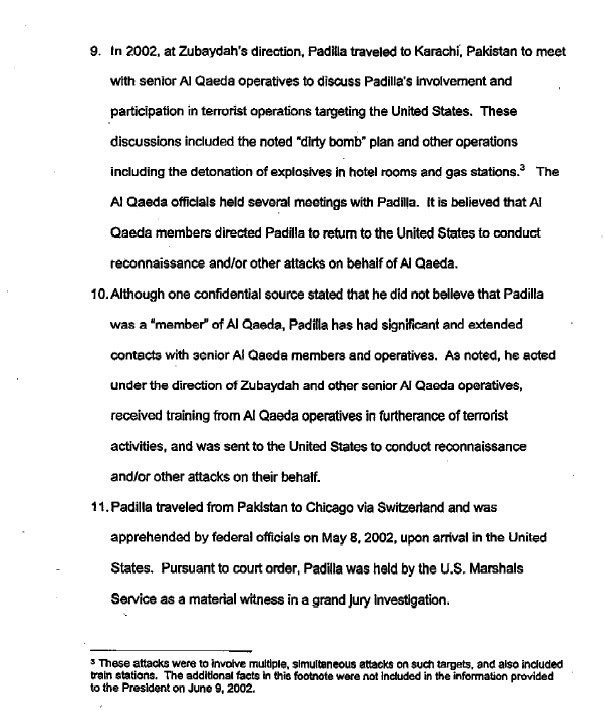|
Jose Padilla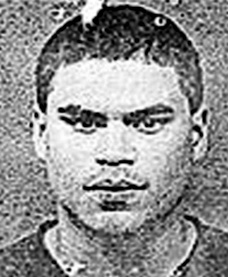 Back in the good old days, your biggest concern about the guy behind the counter at Taco Bell was that he might spit in your burrito.
Back in the good old days, your biggest concern about the guy behind the counter at Taco Bell was that he might spit in your burrito. But this is the 21st century, and nowadays you have to worry about whether he's working for Osama bin Laden instead of a talking chihuahua: "Yo quiero uranio enriquecido." Jose Padilla is the poster boy for just about everything that can go wrong with America's youth. As a teenage gang member in Chicago, he cast himself as the perfect extra in some tedious Charles Bronson revenge flick. After a string of arrests for petty crime, he was arrested at the age of 14 for taking part in a group assault, robbery and murderous stabbing that was notable for its simple-minded brutality. He spent his teen years in juvenile hall. Young adulthood didn't suit him much better. His series of petty crimes continued unrelentingly. He didn't learn from experience, fighting with and fleeing cops virtually every single time he was arrested, despite the fact that fleeing clearly wasn't his forte. When his family moved to Florida, he came along for the ride, perhaps in the hopes that a warmer climate would mellow his disposition. No such luck. In 1991, he was stopped after firing a gun at another driver in a road rage incident. He resisted arrest, of course, and spent 10 months in jail. After this stint in prison, Padilla emerged a changed man. Well, OK, not so much a changed man as a slightly calmer version of the same man. He continued a lifelong pattern of traffic violations but managed to avoid pulling guns on cops for a while. The "new" Jose Padilla hooked up with a girl and got himself a job at a Taco Bell in Davie, Fla. He also got religion. And suddenly his life became a little less Charles Bronson than John le Carre, if John le Carre was an idiot.
Becoming IbrahimThere are conflicting reports about when Padilla found Islam. Several anonymous government sources have told news organizations that he converted while in that South Florida prison. But several news stories indicate that he first started seeking out information about Islam during his stint at Taco Bell.
South Florida, and the Fort Lauderdale area in particular, has long been considered a center for radical and extremist Islam in the U.S., and several mosques and organizations in the area have been tied to al Qaeda and other terrorist groups. One of the first people Jose Padilla met was Adham Hassoun, an outspoken Palestinian activist living in the area. Hassoun had recently quit his job as a computer programmer to oversee the opening of a Muslim charity in Plantation, Fla., five minutes from Padilla's Taco Bell. The Benevolence International Foundation was new to the area and had only recently incorporated in the U.S. But the purported charity had existed for a couple of years in previous incarnations — with offices in Pakistan, the Sudan, Saudi Arabia and the Philippines. The organization can be traced back to the wealthy Saudis who founded its predecessor groups, two sheikhs with strong ties to Osama bin Laden. The federal government charges that Benevolence is a front organization for al Qaeda, and that it diverted funds and other resources from charitable causes to terrorist activities. Benevolence was hardly the only major connection to terrorism in South Florida, although it is a significant one for Padilla. The federal government charges that Hassoun recruited Padilla into Islam and possibly into the Islamic Group, the al Qaeda-linked terrorist group responsible for the 1993 World Trade Center bombing. But there were plenty of opportunities. Other figures in Padilla's new social circle have been connected to charities under investigation, and to terrorist groups Hizbollah and Hamas. Padilla began studying Islam at the nearby Darul Uloom Islamic Institute and the al-Iman mosque, both of which were reputed to have connections to extremism. In 1994, Padilla formally converted to Islam and changed his name to "Ibrahim."
From Ibrahim to Abdullah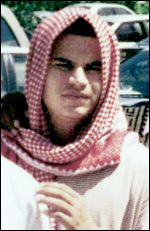 Millions of people have converted to Islam, but only a tiny fraction of them become terrorists. Jose Padilla, unremarkable in most ways, would at least be able to claim that distinction.
Millions of people have converted to Islam, but only a tiny fraction of them become terrorists. Jose Padilla, unremarkable in most ways, would at least be able to claim that distinction. At the time of Padilla's conversion, al Qaeda was actively recruiting U.S. citizens in the Fort Lauderdale area, seeking the power of "clean" U.S. and European passports in the hands of operatives with no prior connection to terrorism. In its quest to get its hands on those passports, al Qaeda recruited some of its most fucked-up and useless operatives, including insane French "20th hijacker" Zacarias Moussaoui and incompetent British shoe-bomber Richard Reid. Padilla appears to have kept a low profile in the mid-1990s, studying Islam and marrying his girlfriend, who also converted. He quit the Taco Bell in spring 1994, and after a brief stint as a maintenance worker, Ibrahim nee Jose left the 9-to-5 world behind by that summer. Without visible means of support, he and his wife nevertheless seemed to get along just fine, and by some accounts, he appeared to be quite well off. Absent a job and a visible role in the community, Padilla didn't leave large footprints in South Florida during this time, save for a steady stream of traffic violations for lousy driving, which even Islam couldn't cure.
Perhaps having fulfilled all his traffic ambitions, Padilla was ready to move on to bigger and better things. In 1998, he abruptly left his wife and went to Egypt to "learn Arabic," as he told acquaintances. His trip was sponsored by "friends." Following a well-established pattern among American al Qaeda recruits, Padilla traveled to Egypt largely as a waystation to the Pakistan-Afghanistan border region, a diversion designed to minimize suspicion from customs officials. He apparently took a second wife at some point along the way. Once in Pakistan, Padilla changed his name once more, to Abdullah al-Muhajir, which translates as "Abdullah the Immigrant" (an improvement over Padilla's boyhood nickname "Pucho," which translates as "pudgy"). Little has been disclosed about Padilla's time in training, but when it was completed, the terrorist formerly known as Pucho was assigned to a task that, to all appearances, lay well beyond his limited skill set — obtaining uranium for use in a radiological dispersion device, or a "dirty bomb" which combines conventional explosives with radioactive toxins. Abu Zubayda, the Qaeda lieutenant in charge of Padilla for at least some of his time in Pakistan, must surely have realized that Pucho was muy estupido. Time Magazine related an anecdote from early 2002 in which Padilla came to Zubayda proudly flourishing schematics to build a nuclear warhead... which he had found on the Internet. You can probably guess where this is going. Time called the plans "laughably inaccurate" and suggested they might have come from a parody Web site. Despite the fact he was obviously no Ramzi Yousef, Padilla seemed to have inexplicably ingratiated into the very highest level of al Qaeda. Before his capture by U.S. forces shortly after the meeting cited above, Zubayda was a top al Qaeda planner. While in Pakistan, Padilla also reported to Khalid Shaikh Mohammed, al Qaeda's No. 3 leader and the mastermind of the September 11 attacks. Zubayda and Khalid Shaikh jointly sealed Padilla's fate as 2002 moved forward. In April, the government originally claimed, Khalid Shaikh personally dispatched Padilla to the United States, with a few grand in cash to execute a mission. Abu Zubayda, in U.S. custody by this time, allegedly fingered Padilla as an "important" al Qaeda operative, providing color on the "dirty bomb" plot. By Zubayda's account, which may not be reliable, Padilla's assignment was to scout targets for a radiological dispersion attack.
As a result of the Zubaydah tip, government officials arrested Padilla in May when he walked off his plane at the international airport in Chicago, his hometown and (likely not coincidentally) the current headquarters of the Benevolence International Foundation. Attorney General John Ashcroft announced the arrest one month later, in a melodramatic televised "dirty bombers among us" speech which scared the hell out of many Americans. The speech inflated little Pucho into a front page story, much to the displeasure of the White House, which reportedly restricted Ashcroft's press activities severely in the wake of the fiasco. Padilla was yanked from the criminal justice system and declared an enemy combatant, a legal term which means "nonentity." He was tossed in a military brig in North Carolina and held incommunicado, forbidden from contacting family or legal counsel. His court-appointed attorney from the initial arrest filed suit to force the military to let Padilla talk to her. After a long court battle, two apparently contradictory things happened. First, the activist liberal courts rewrote the laws and awarded the president an astoundingly huge power to detain U.S. citizens as enemy combatants, regardless of whether they were arrested in the mountains of Afghanistan or in the corridors of O'Hare. Second, the government performed an abrupt about face and indicted Padilla, transferring him to civilian custody.
The intentional oxymoron was an attempt by the Bush administration to avoid the one thing it feared most -- a Supreme Court showdown over the lowly former gang The president's men had it all figured out -- no prisoner, no appeal. And a good thing too, because Padilla's alleged crimes just kept shrinking and shrinking and shrinking. The long-awaited indictment didn't mention dirty bombs or apartment explosions. In fact, it barely accused Padilla of anything except hanging out with the wrong crowd and filling out an al Qaeda job application form. The courts were not amused. A short, ugly battle ensued. Writing that the administration had punted solely "to avoid consideration of our decision by the Supreme Court," the appeals court reversed its earlier ruling and tried to keep Padilla in the brig in order to force the Supreme Court's hand. The Supremes ordered Padilla released to civilian authorities but reserved the right to review the enemy combatant precedent. Curses! How dare the course of Justice run smooth? The broad issue aside, the artist formerly known as the "Dirty Bomber" has landed a cushy berth in an honest-to-God civilian prison. While the Constitutional crisis leaves him behind, Padilla faces charges of conspiracy related to a small Florida terrorist cell loyal to blind Sheikh Omar Abdel Rahman. The cell may -- or may not -- have participated in a murder in Egypt, far from the Miami courtroom where the case will be heard. What happened to the dirty bombs? The apartment plots? Two major problems sank any hope of prosecuting Padilla for his alleged outrages:
|
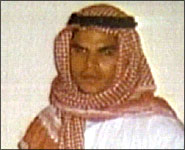 Padilla's boss, a Muslim, told reporters that young Jose asked him about where he could study Islam. Citing a workplace policy against discussing religion, the supervisor says he told Padilla to find a mosque through the yellow pages.
Padilla's boss, a Muslim, told reporters that young Jose asked him about where he could study Islam. Citing a workplace policy against discussing religion, the supervisor says he told Padilla to find a mosque through the yellow pages. 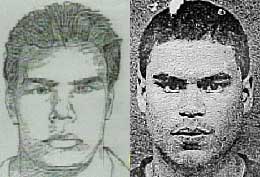 Padilla incurred violations like clockwork from the moment he emerged from prison until his license was suspended in 1997 (with the exception of a six-month quiet period around the time of the Oklahoma City bombing; no doubt coincidentally, Padilla bears a striking resemblance to police sketches of "John Doe 2", an alleged Hispanic accomplice of
Padilla incurred violations like clockwork from the moment he emerged from prison until his license was suspended in 1997 (with the exception of a six-month quiet period around the time of the Oklahoma City bombing; no doubt coincidentally, Padilla bears a striking resemblance to police sketches of "John Doe 2", an alleged Hispanic accomplice of 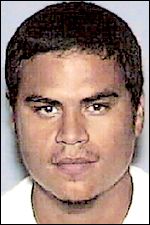 However, this account eventually came into question. In 2004, the Justice Department issued a revised list of allegations about Padilla's nefarious intentions. This time, they said he was planning to blow up apartment buildings in the southwestern U.S. The list of supposed crimes would only continue to shrink.
However, this account eventually came into question. In 2004, the Justice Department issued a revised list of allegations about Padilla's nefarious intentions. This time, they said he was planning to blow up apartment buildings in the southwestern U.S. The list of supposed crimes would only continue to shrink. 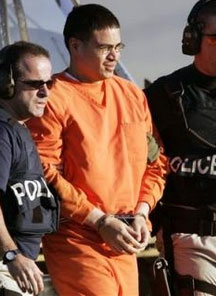 member. The lower courts had handed down a ruling that allowed Bush to throw anyone in the hole, at any time, with no accountability and no apparent limits. There was no reason to take the chance that a strictly constructionist Supreme Court might remember a little thing called the Fourth Amdendment and strike down the precedent.
member. The lower courts had handed down a ruling that allowed Bush to throw anyone in the hole, at any time, with no accountability and no apparent limits. There was no reason to take the chance that a strictly constructionist Supreme Court might remember a little thing called the Fourth Amdendment and strike down the precedent. 